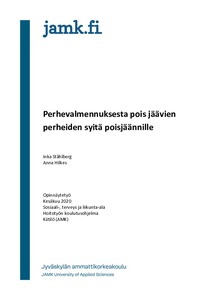Perhevalmennuksesta pois jäävien perheiden syitä poisjäännille
Hilkes, Anna; Ståhlberg, Inka (2020)
Hilkes, Anna
Ståhlberg, Inka
2020
All rights reserved. This publication is copyrighted. You may download, display and print it for Your own personal use. Commercial use is prohibited.
Julkaisun pysyvä osoite on
https://urn.fi/URN:NBN:fi:amk-2020060817773
https://urn.fi/URN:NBN:fi:amk-2020060817773
Tiivistelmä
Perhevalmennus on yksi äitiyshuollon arvostetuimmista tehtävistä, jonka lähtökohtana on ohjata sekä valmistaa ensimmäistä kertaa vanhemmiksi tulevia tulevaan vanhemmuuteen ja synnytykseen. Vaikka perhevalmennukseen osallistuminen on ollut aktiivista, on osallistujien määrä ollut laskusuunnassa ja sitä on perusteltu muun muassa vanhempien koulutustason nousulla.
Opinnäytetyön tarkoituksena on selvittää mistä syistä perheet jäävät pois perhevalmennuksesta. Lisäksi tehtävänä on selvittää mahdollisia kehityskohteita perhevalmennukselle. Tavoitteena on tuoda perhevalmennuksen järjestäjien tietoon syitä valmennuksesta poisjäämiselle ja mahdollisia kehitystarpeita asiakkaiden näkökulmasta.
Opinnäytetyö on toteutettu laadullisena tutkimuksena ja aineisto on kerätty verkkokyselyn avulla. Kohderyhmänä olivat vuosien 2016-2019 välillä ensimmäisen lapsensa saaneet vanhemmat. Lopullinen aineisto koostui saturaation perusteella 32 vastauksesta.
Tutkimustulosten perusteella voitiin todeta, että perhevalmennuksen osallistumiselle ja osallistumatta jättämiselle on monia syitä. Vastausten keskuudesta nousi esiin muun muassa tyytymättömyys perhevalmennuksen järjestelyitä kohtaan. Vastaajat kokivat myös neuvolan toiminnan vaikuttaneen osallistumattomuuteen. Vastaajat esittivät toiveita erityisesti perhevalmennuksen sisältöön sekä toteutukseen liittyen. One of the most highly valued tasks of maternity care is antenatal education whose purpose is to guide and prepare primigravida and their spouses for the upcoming parenthood and delivery. Even though participation in antenatal education has been active, the number of participants has decreased, and one of the reasons for this is believed to be parents’ higher level of education.
The purpose of the thesis was to examine the reasons for why some parents do not participate in childbirth and parenthood education. Another purpose was to find possible development targets for antenatal education. The aim was to increase the organizers’ understanding of the non-participation and propose possible improvements for antenatal education from the clients’ point of view.
The thesis had a qualitative research approach, and the data was collected by using an online survey. The focus group was parents who had had their first child between 2016 and 2019. Based on the saturation point, the final data was consisted of 32 responses.
According to the results, there were many reasons for antenatal education participation and non-participation. One of the reasons was dissatisfaction with the arrangements of the education. The respondents also stated that the operations of the maternity clinic had affected their non-participation. The respondents also expressed wishes that were especially related to the content and arrangements of antenatal education.
Opinnäytetyön tarkoituksena on selvittää mistä syistä perheet jäävät pois perhevalmennuksesta. Lisäksi tehtävänä on selvittää mahdollisia kehityskohteita perhevalmennukselle. Tavoitteena on tuoda perhevalmennuksen järjestäjien tietoon syitä valmennuksesta poisjäämiselle ja mahdollisia kehitystarpeita asiakkaiden näkökulmasta.
Opinnäytetyö on toteutettu laadullisena tutkimuksena ja aineisto on kerätty verkkokyselyn avulla. Kohderyhmänä olivat vuosien 2016-2019 välillä ensimmäisen lapsensa saaneet vanhemmat. Lopullinen aineisto koostui saturaation perusteella 32 vastauksesta.
Tutkimustulosten perusteella voitiin todeta, että perhevalmennuksen osallistumiselle ja osallistumatta jättämiselle on monia syitä. Vastausten keskuudesta nousi esiin muun muassa tyytymättömyys perhevalmennuksen järjestelyitä kohtaan. Vastaajat kokivat myös neuvolan toiminnan vaikuttaneen osallistumattomuuteen. Vastaajat esittivät toiveita erityisesti perhevalmennuksen sisältöön sekä toteutukseen liittyen.
The purpose of the thesis was to examine the reasons for why some parents do not participate in childbirth and parenthood education. Another purpose was to find possible development targets for antenatal education. The aim was to increase the organizers’ understanding of the non-participation and propose possible improvements for antenatal education from the clients’ point of view.
The thesis had a qualitative research approach, and the data was collected by using an online survey. The focus group was parents who had had their first child between 2016 and 2019. Based on the saturation point, the final data was consisted of 32 responses.
According to the results, there were many reasons for antenatal education participation and non-participation. One of the reasons was dissatisfaction with the arrangements of the education. The respondents also stated that the operations of the maternity clinic had affected their non-participation. The respondents also expressed wishes that were especially related to the content and arrangements of antenatal education.
